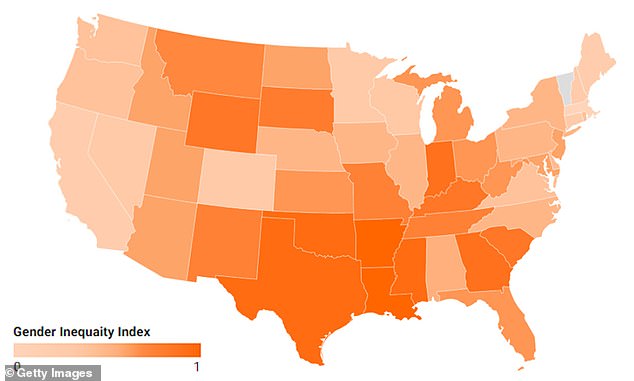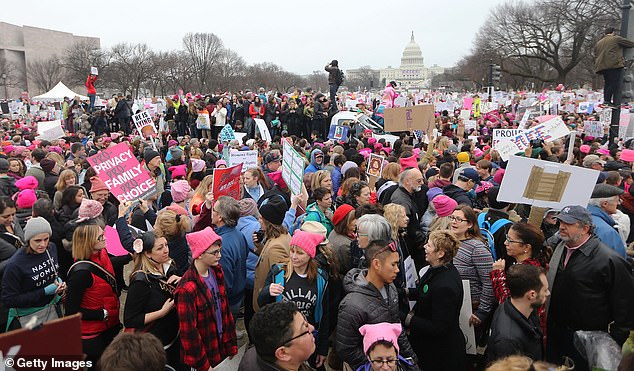As soul legend James Brown sang in 1966, ‘It’s a Man’s Man’s Man’s World,’ and while many US states now treat the sexes more equally, some are plagued by inequality.
A new study has found that Arkansas, Louisiana and Oklahoma ranked as the hardest places to live as a woman of any state in America with Massachusetts, California and Maine ranking easiest.
That’s the finding from scientists who developed a measurement system that looked at teen pregnancy statistics, deaths during pregnancy, percentages of women in political office, local polling on safety, financial well-being and more to assess state-level equality and inequality between the sexes.
The researchers’ state-by-state rankings — which were based on metrics currently in-use by the United Nations — also brought to light a potentially instructive trend.
They also found that states with lower equality for women also had lower financial well-being for men.
‘Gender inequality is negatively associated with economic growth,’ the team wrote in their new study, ‘leading to less financial well-being for all members of the society.’
Scientists found that Arkansas, Louisiana and Oklahoma ranked as the hardest places to live as a woman of any state in America – with Massachusetts, California and Maine ranking as the best. Above, a homeless women sits on a curb in Oklahoma City, Oklahoma on July 9, 2024
Among other top ranked states, Connecticut, Minnesota, New Hampshire, Nevada and Colorado all scored high for equality between the sexes and greater well-being.
And hovering above the bottom three, Texas, Mississippi, Georgia, Indiana, South Carolina and Wyoming were found to have the least equal treatment between men and women among US states.
The UN’s version of the metric that inspired this research, known as the Gender Inequality Index (GII), includes data like the ‘maternal mortality ratio,’ which records the number of pregnant women who died per 100,000 live births.
It also includes the ‘adolescent birthrate,’ or the number of births per 1,000 women between the ages of 15-19 — often used by social scientists as a gauge of high quality educational access and more adequate protections against sexual abuse.
The GII also incorporates the percentage of women in public office and the percentage of men and women with at least a high school education, among other factors, as detailed in the researchers’ new study published Wednesday in the journal PLoS ONE.
But the researchers — psychologists from the University of Padova in Italy and New York University Abu Dhabi in the United Arab Emirates — built upon the UN index tailoring it with uniquely American data for their own state-by-state assessments.
The team collected survey data of US polling company Gallup’s US Dailies.
Gallup’s US Dailies helped the team assess broad public sentiments by state for women’s financial well-being, health and their subjective perceptions of safety where they live.
Typical survey questions asked ‘Do you have any health problems that prevent you from doing any of the things people your age normally can do?’ and requested that respondents rank their agreement with the phrase ‘You always feel safe and secure.’
The US-centric version of the GII scores created with this more localized data ranged from 0.16 for Massachusetts, on the more equal side, to 0.36 for Louisiana, on the more on equal side. The full range of the GII is from 0.00 to 1.00.
For comparison, the UN’s country-by-country GII ranked a notoriously unequal nation like Afghanistan at 0.69 and a more equal nation like Sweden at 0.036 for the same year’s worth of data, 2016.

Researchers’ state rankings also revealed a possibly instructive trend: states with low equality for women also had low financial well-being for men. ‘Gender inequality is negatively associated with economic growth,’ they wrote. Above, man and a woman in Maine enjoy a hike
The researchers noted that their economic findings made plain ‘the need to address gender inequality not just as a social justice issue, but also as a means to boost in particular women’s but also men’s overall well-being.’
‘A lack of job opportunities for women,’ they wrote, ‘places a burden also on male earners, who face the added stress of supporting a family without the benefit of spousal earnings.’
Those financial scenarios also carried physical risks for women as well, based on the their modified GII tabulations.
‘In contexts of high gender inequality, women tend to be economically dependent on men and therefore have less control over their lives,’ they assessed in the study.
‘This can make them more vulnerable to domestic violence or abuse.’

After the worst offenders – Arkansas , Louisiana and Oklahoma – Texas, Mississippi, Georgia, Indiana, South Carolina and Wyoming were found to have the least equal treatment between men and women among US states (above, a static version of the interactive map)

Emphasizing the need for more political action on these issues, the team added that ‘153 countries’ legal systems still discriminate economically against women, including 18 in which husbands can legally prevent their wives from working’
The researchers also conducted a second study where they compared their modified GII figures for each state by the number of Tweets (now X posts) about various hot-button issues, including abortion and the #MeToo social movement.
‘Analysis of geo-localized messages on the Twitter social media platform reveals that higher GII-S scores were associated with fewer tweets containing the #MeToo hashtag,’ the researchers said.
The team also noted that politically right-leaning states appeared to show worse gender equality based on their metrics.
‘Gender inequality is a pervasive global problem that affects rich and poor countries alike. A 2019 Oxfam report showed that nearly two-thirds of the world’s 781 million illiterate adults are women,’ they noted, ‘a proportion that has remained largely unchanged for two decades.’
Emphasizing the need for more political action on these issues, the team added that ‘153 countries’ legal systems still discriminate economically against women, including 18 in which husbands can legally prevent their wives from working.’





